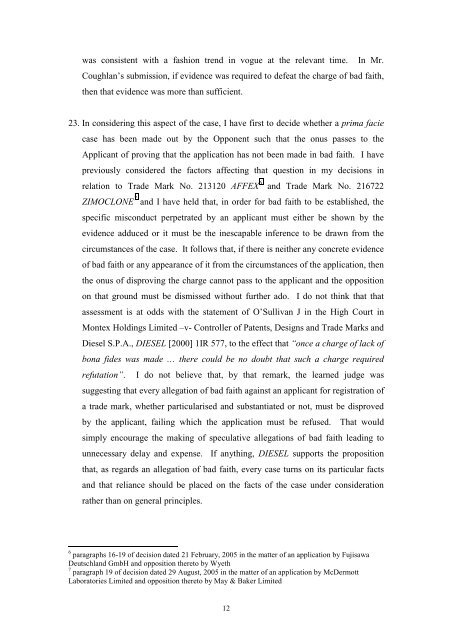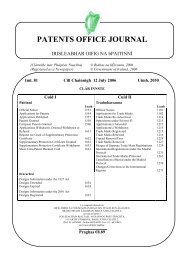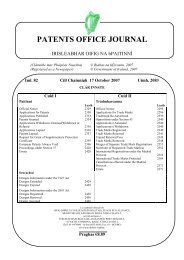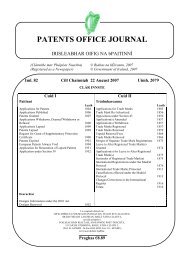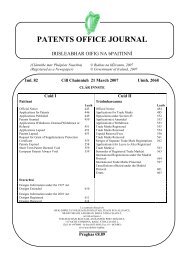TRADE MARKS ACT, 1963 - Irish Patents Office
TRADE MARKS ACT, 1963 - Irish Patents Office
TRADE MARKS ACT, 1963 - Irish Patents Office
You also want an ePaper? Increase the reach of your titles
YUMPU automatically turns print PDFs into web optimized ePapers that Google loves.
was consistent with a fashion trend in vogue at the relevant time. In Mr.<br />
Coughlan’s submission, if evidence was required to defeat the charge of bad faith,<br />
then that evidence was more than sufficient.<br />
23. In considering this aspect of the case, I have first to decide whether a prima facie<br />
case has been made out by the Opponent such that the onus passes to the<br />
Applicant of proving that the application has not been made in bad faith. I have<br />
previously considered the factors affecting that question in my decisions in<br />
relation to Trade Mark No. 213120 AFFEX 6 and Trade Mark No. 216722<br />
ZIMOCLONE 7 and I have held that, in order for bad faith to be established, the<br />
specific misconduct perpetrated by an applicant must either be shown by the<br />
evidence adduced or it must be the inescapable inference to be drawn from the<br />
circumstances of the case. It follows that, if there is neither any concrete evidence<br />
of bad faith or any appearance of it from the circumstances of the application, then<br />
the onus of disproving the charge cannot pass to the applicant and the opposition<br />
on that ground must be dismissed without further ado. I do not think that that<br />
assessment is at odds with the statement of O’Sullivan J in the High Court in<br />
Montex Holdings Limited –v- Controller of <strong>Patents</strong>, Designs and Trade Marks and<br />
Diesel S.P.A., DIESEL [2000] 1IR 577, to the effect that “once a charge of lack of<br />
bona fides was made … there could be no doubt that such a charge required<br />
refutation”. I do not believe that, by that remark, the learned judge was<br />
suggesting that every allegation of bad faith against an applicant for registration of<br />
a trade mark, whether particularised and substantiated or not, must be disproved<br />
by the applicant, failing which the application must be refused. That would<br />
simply encourage the making of speculative allegations of bad faith leading to<br />
unnecessary delay and expense. If anything, DIESEL supports the proposition<br />
that, as regards an allegation of bad faith, every case turns on its particular facts<br />
and that reliance should be placed on the facts of the case under consideration<br />
rather than on general principles.<br />
6 paragraphs 16-19 of decision dated 21 February, 2005 in the matter of an application by Fujisawa<br />
Deutschland GmbH and opposition thereto by Wyeth<br />
7 paragraph 19 of decision dated 29 August, 2005 in the matter of an application by McDermott<br />
Laboratories Limited and opposition thereto by May & Baker Limited<br />
12


